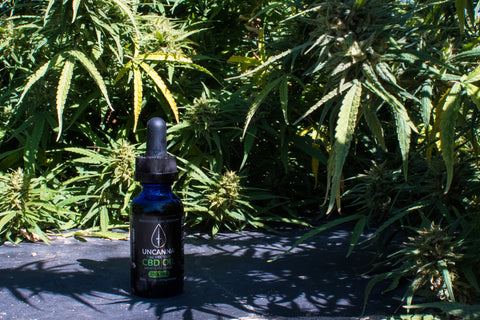CBD and Inflammation
Oct 24, 2021
Pain from inflammation is inevitable and likely will affect all adults at some point in their life. For some, this has potential to become a chronic condition and generally interferes with a normal quality of life.
Medications in the form of over-the-counter (OTC) and prescription anti-inflammatories are easily accessed and readily prescribed. The leading anti-inflammation meds are called, NSAIDS, or non-steroidal anti-inflammatory drugs. Consumer survey responses show < 17 million Americans take NSAIDS on daily basis, with < 70 million prescription medications and 30 billion OTC NSAID tablets are sold and distributed annually in the United States. For reference, OTC NSAIDs include asprin, ibuprofen, and naproxen and prescription NSAIDs include drugs such as celecoxib, ketoprofen, diclofenac, and etodolac.
So how do NSAIDs work? NSAIDs block enzymes called COX-1 and COX-2. These enzymes are responsible for producing a group of compounds that our cells make that are called prostaglandins. CXO-1 prostaglandins activate platelets (for blood clotting purposes) and provide protection for you stomach and intestine linings. COX-2 prostaglandins are made as a response to injury or infection and they regulate the resulting inflammation. Most NSAIDs work non-selectively on both enzymes. This is an issue as pain and inflammation relief from NSAIDs come from blocking COX-2 , but COX-1 is also blocked it results in unwanted and adverse side effects.
SERIOUS SIDE EFFECTS
NSAIDs have common and at times, serious side effects. Studies have found the risk of NSAID drug reactions to be an appalling 26%.
Complications include but are not limited to: Gastrointestinal bleeding and ulcers, heartburn, ringing in the ears, leg swelling, headaches, dizziness, liver or kidney problems, high blood pressure, heart attack, heart failure, stroke and even death.
100,000 NSAID users are hospitalized annually due to gastrointestinal complications. A shocking 11% of drug related hospital admissions could be attributed to NSAIDs. In 2005 and 2007 the US Food and Drug Administration issued public health advisories concerning cardiovascular risks with NSAIDs and individuals taking drugs for such conditions. Following that, in 2016, the FDA further strengthened existing labels to warn consumers of an increased risk of heart attack and stroke. Several NSAIDs have been completely removed from the market as their risk far outweighs their benefit and is an entire pharmaceutical “misrepresentation”.
For the past several decades, multiple studies have proven the anti-inflammatory benefits of phytocannabinoids and terpenoids, which are compounds that are abundant in the cannabis plant.
See Product Information & Details here
The plant cannabinoids have many different mechanisms of action in their anti-inflammatory properties, including the blockage of pro-inflammatory compounds that are made in the body because of injury or illness. CBDA, cannabidiolic acid, the raw non-psychoactive cannabinoid precursor to CBD, showed significant COX-2 enzyme blockage when compared to placebo, two NSAIDs and other cannabinoids. Dr. Ethan Russo and Dr. Geoffrey Guy, in their excellent 2005 study, report that the phytocannabinoids work synergistically (the "entourage effect") to provide balanced and nontoxic medicinal effects when compared with single molecule anti-inflammatories. “I have seen thousands of patients eliminate or reduce the need for NSAIDs, reducing their risks of side effects and possibly even death, with the use of cannabis".
See Product Information & Details here
DISCLAIMER:
FDA DISCLAIMERS APPLY TO ALL OF OUR PRODUCTS. THIS INFORMATION IS FOR GENERAL PURPOSES ONLY & IS NOT INTENDED TO PROVIDE MEDICAL TREATMENT OR ADVICE ON ANY ISSUE.
Sources:
- Booz, George W. “Cannabidiol as an emergent therapeutic strategy for lessening the impact of inflammation on oxidative stress.”Free Radical Biology and Medicine 51.5 (2011): 1054-1061.
- Gor AP, Saksena M. Adverse drug reactions of nonsteroidal anti-inflammatory drugs in orthopedic patients.Journal of Pharmacology & 2011;2(1):26-29. doi:10.4103/0976-500X.77104.
- Howard RL, Avery AJ, Slavenburg S, et al. Which drugs cause preventable admissions to hospital? a systematic review.Br J Clin Pharmacol. 2007;63(2):136-147
- Klein, Thomas W. “Cannabinoid-based drugs as anti-inflammatory therapeutics.”Nature Reviews Immunology 5.5 (2005): 400-411
- Mecha, M., et al. “Cannabidiol provides long-lasting protection against the deleterious effects of inflammation in a viral model of multiple sclerosis: A role for A 2A receptors.”Neurobiology of disease 59 (2013): 141-150.
- Nagarkatti, Prakash, et al. “Cannabinoids as novel anti-inflammatory drugs.”Future medicinal chemistry 1.7 (2009): 1333-1349
- Pertwee, G.“Cannabis and cannabinoids: pharmacology and rationale for clinical use.” Pharm Sci 1997;3:539-45.
- Russo, Ethan, and Geoffrey W. Guy. “A tale of two cannabinoids: the therapeutic rationale for combining tetrahydrocannabinol and cannabidiol.”Medical hypotheses 66.2 (2006): 234-246.
- Slone Epidemiology Unit. Prepared for McNeil Consumer Healthcare. Analgesic use in the adult population of the United States: Acetaminophen, aspirin, ibuprofen and naproxen. Results of a population-based telephone survey, 1998-2001. Report on file, 2001.
- Takeda, Shuso, et al. “Cannabidiolic acid as a selective cyclooxygenase-2 inhibitory component in cannabis.”Drug metabolism and disposition 36.9 (2008): 1917-1921.
- Xiong, Wei, et al. “Cannabinoids suppress inflammatory and neuropathic pain by targeting α3 glycine receptors.”Journal of Experimental Medicine (2012): jem-20120242
- Wolfe M. MD, et al, The New England Journal of Medicine, June 17, 1999, Vol. 340, No. 24, pp. 1888-1889
13. Goldstein, B, 2019, https://www.projectcbd.org/wellness/trade-your-ibuprofen-cannabis


